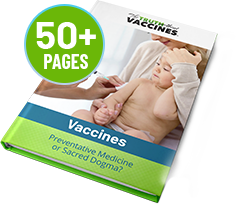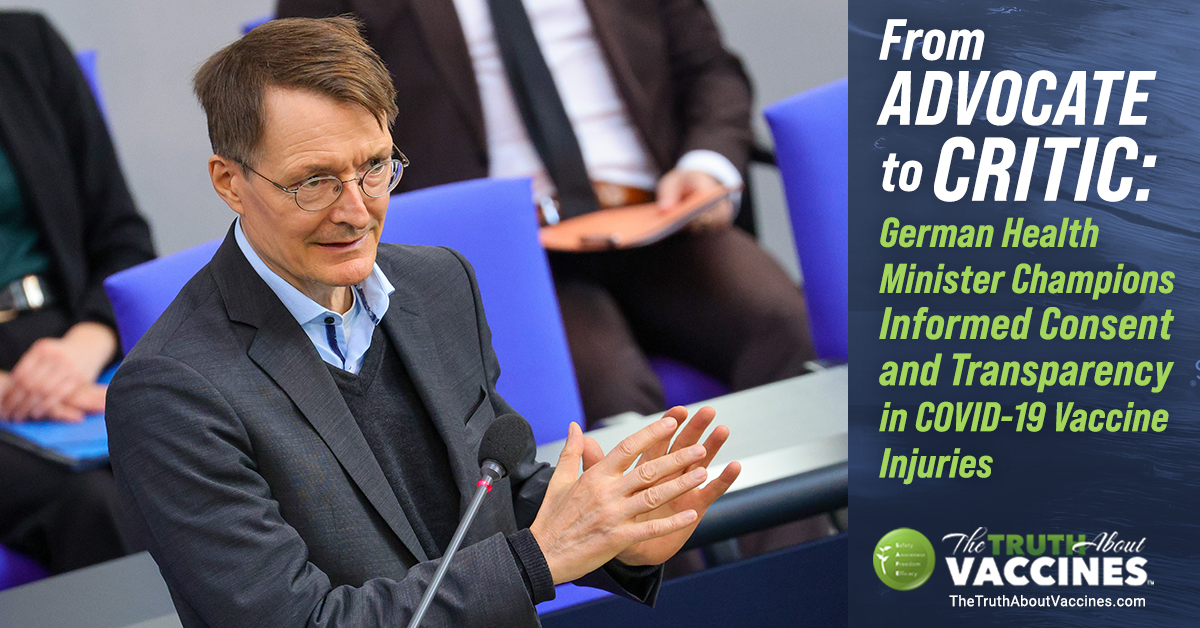TTAV is experiencing heavy censorship on many social media channels since we’ve been targeted by the mainstream media sellouts, social media bullies, and political turncoats. Be sure to get the TRUTH by subscribing to our email list. It’s free.
Karl Lauterbach, a prominent German politician and epidemiologist, recently called for increased transparency in reporting adverse reactions and injuries related to COVID-19 vaccinations. Lauterbach’s timely demand for open communication and accurate reporting of vaccine-related issues emphasizes the importance of informed consent, a cornerstone of ethical medical practice, in a world grappling with the pandemic.
As a member of the German Bundestag representing the Social Democratic Party (SPD), Lauterbach has been an influential voice in Germany’s response to the COVID-19 pandemic. Trained as an epidemiologist and health economist, Lauterbach’s push for transparency in vaccine injury reporting aims to ensure that individuals can make well-informed decisions about their health.
Why Informed Consent is a Moral Imperative
Informed consent is an essential aspect of medical ethics. It grants patients the right to be fully informed about the potential risks and benefits of any medical intervention, including vaccination. By having access to accurate and transparent information about vaccine injuries, individuals can make educated choices about their healthcare.
Transparency in reporting vaccine injuries is vital for upholding the principle of informed consent. Open communication about potential risks and side effects allows patients to weigh the benefits and risks of vaccination, ensuring they have the information needed to make informed decisions.
The Children’s Health Defense, founded by our friend Robert F. Kenneddy, Jr., emphasizes the importance of reporting vaccine injuries and advocates for open and honest communication surrounding vaccine-related issues. The organization supports the idea that transparency is crucial for preserving informed consent and individual autonomy in healthcare decisions.
In an excerpt from his book “The Real Anthony Fauci: Bill Gates, Big Pharma, and the Global War on Democracy and Public Health,” Kennedy explains how the system is rigged against transparency and accountability:
“They write the steady stream of editorials that appear in local and national newspapers to reinforce the hackneyed orthodoxies of the pharmaceutical paradigms—“all vaccines are safe and effective,” etc. They root out heresy by sitting on the state medical boards—the “Inquisition” courts—that censure and de-license dissident doctors. They control the medical journals and peer-review journal literature to fortify Pharma’s agenda. They teach on medical school faculties, populate journal editorial boards, and chair university departments. They supervise hospitals and chair hospital departments. They act as expert witnesses for pharmaceutical companies in civil court and the federal vaccine court. They present awards to one another.”
The Truth About Reporting Systems
In the United States, the Vaccine Adverse Event Reporting System (VAERS) is a critical tool for tracking and reporting potential vaccine-related injuries. This system allows healthcare providers and the public to report adverse events, which are then analyzed by experts to identify trends and patterns in vaccine safety. Germany has its own system for reporting vaccine injuries, known as the Paul Ehrlich Institute (PEI). Like VAERS, the PEI collects data on adverse events following immunization to monitor vaccine safety and inform public health policy. Lauterbach’s call for transparency in reporting vaccine injuries is directed at the PEI and other relevant agencies.
Underreporting is a significant challenge in reporting vaccine injuries. Some healthcare providers and patients may be hesitant to report adverse events, fearing that they could contribute to vaccine hesitancy or be perceived as anti-vaccine. This can lead to incomplete or inaccurate data, making it difficult for individuals to exercise informed consent.
Responding to Lauterbach’s March 12 statements, Byram Bridle, Ph.D., associate professor of viral immunology at Canada’s University of Guelph, said the 1 in 10,000 figure regarding severe adverse effects of the COVID-19 vaccines is likely low.
“This statistic is almost certainly an underestimation, due to the well-known under-reporting inherent to passive monitoring systems,” Bridle wrote on his blog, “especially when coupled to pressures on physicians to parrot the ‘safe and effective’ motto,” citing academic studies to this effect.
Encouraging healthcare providers and the public to report adverse events is crucial for overcoming underreporting. Ensuring that reporting systems are user-friendly and accessible can help promote reporting and facilitate the collection of accurate data on vaccine-related injuries, bolstering informed consent.
By promoting transparency in reporting vaccine injuries, public health officials and policymakers can help to ensure that people can make informed choices about vaccination. Accurate and accessible information about vaccine injuries is a crucial component of upholding the principle of informed consent.
The Nuremberg Code of Ethics
The Nuremberg Code, a set of research ethics principles established after World War II, has played a significant role in shaping modern medical ethics, particularly in the context of human experimentation. One of the primary tenets of the Nuremberg Code is the requirement for voluntary informed consent, emphasizing the importance of providing research participants with comprehensive information about the potential risks and benefits of any intervention, including vaccines.
Administering vaccines without acknowledging that they are not 100% safe or effective goes against the fundamental principles of the Nuremberg Code and informed consent. In order to respect patients’ autonomy and their right to make informed decisions about their healthcare, it is crucial for healthcare providers and public health officials to communicate the potential risks and benefits of vaccines transparently. This includes recognizing and addressing any limitations in vaccine safety and efficacy.
Failing to adhere to the principles outlined in the Nuremberg Code, such as providing comprehensive information about vaccine risks and benefits, can have significant ethical implications. It undermines the foundation of trust between patients and healthcare providers and may erode public confidence in public health agencies. Moreover, it could potentially expose vulnerable populations to unnecessary harm if they are not fully aware of the risks involved in receiving a vaccine.
Adherence to the Nuremberg Code and its principles, including informed consent, is essential when administering vaccines. Transparently acknowledging that vaccines are not 100% safe or effective ensures that patients are provided with all necessary information to make well-informed decisions about their healthcare. Upholding the principles of the Nuremberg Code and informed consent not only fosters trust between patients and healthcare providers but also supports ethical medical practice.
The Impact of Informed Consent on Vaccination Decisions
The availability of accurate information about vaccine injuries empowers individuals to make informed decisions about vaccination. Upholding the principle of informed consent ensures that individuals can assess the potential risks and benefits of vaccination in light of their personal values and beliefs.
Ensuring transparency in reporting vaccine injuries is an ethical imperative. Public health officials and policymakers have a responsibility to provide accurate, accessible information that allows individuals to make well-informed decisions about their healthcare. By promoting transparency, they not only uphold the principle of informed consent but also respect individual autonomy and the right to make personal healthcare choices.
Conclusion
Karl Lauterbach’s call for transparency in reporting COVID-19 vaccine injuries is a vital step towards preserving informed consent and respecting individual autonomy in healthcare decisions. By championing open communication, accurate reporting, and access to information, public health officials and policymakers can ensure that individuals have the knowledge they need to make well-informed choices about vaccination. This approach, rooted in the principles of informed consent and individual autonomy, is crucial for promoting ethical medical practice and empowering individuals to make decisions that align with their values and beliefs. As the world continues to navigate the challenges of the COVID-19 pandemic, fostering a culture of transparency and informed consent in vaccine injury reporting is essential to safeguarding patient rights and upholding the highest ethical standards in healthcare.
Follow, Subscribe, & SHARE:
1. X, Formerly known as Twitter: https://twitter.com/TTAVOfficial
2. Telegram: https://t.me/TheTruthAboutCancer_Vaccines
3. GAB: https://gab.com/TyCharleneBollinger
4. GETTR: https://gettr.com/user/cancertruth
5. TruthSocial: https://truthsocial.com/@TheTruthAboutCancer
6. CloutHub: https://app.clouthub.com/#/users/u/TheTruthAboutCancer
7. Bitchute: https://www.bitchute.com/channel/vX3lcHH4Dvp0/
8. Rumble: https://rumble.com/c/TheTruthAboutCancerOfficial
9. Brighteon: https://www.brighteon.com/channels/thetruthaboutcancer










GREAT ARTICLE. THANK GOODNESS THE GERMAN HEALTH MINISTER IS GIVING THIS CRITICAL INFORMATION TO THE PUBLIC.